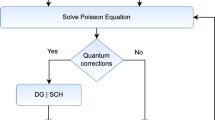Abstract
In this paper, a distributed simulation-based computational intelligence algorithm for inverse problem of nanoscale semiconductor device is presented. This approach features a simulation-based optimization strategy, and mainly integrates the semiconductor process simulation, semiconductor device simulation, evolutionary strategy, and empirical knowledge on a distributed computing environment. For a set of given target current-voltage (I-V) curves of metal-oxide-semiconductor field effect transistors (MOSFETs) devices, the developed prototype executes evolutionary tasks to solve an inverse doping profile problem, and therefore optimize fabrication recipes. In the evolutionary loop, the established management server allocates the jobs of process simulation and device simulation on a PC-based Linux cluster with message passing interface (MPI) libraries. Good benchmark results including the speed-up, the load balancing, and the parallel efficiency are presented. Computed results, compared with the realistic measured data of 65 nm n-type MOSFET, show the accuracy and robustness of the method.
Preview
Unable to display preview. Download preview PDF.
Similar content being viewed by others
References
Li, Y., Chou, H.-M., Lee, J.-W.: Investigation of Electrical Characteristics on Surround-ing-Gate and Omega-Shaped-Gate Nanowire FinFETs. IEEE Trans. Nanotech. 4, 510–516 (2005)
Li, Y., Chou, H.-M.: A Comparative Study of Electrical Characteristic on Sub-10 nm Dou-ble Gate MOSFETs. IEEE Trans. Nanotech. 4, 645–647 (2005)
Li, Y., Yu, S.-M.: A Two-Dimensional Quantum Transport Simulation of Nanoscale Dou-ble-Gate MOSFETs using Parallel Adaptive Technique. IEICE Trans. Inf. Syst. E87-D, 1751–1758 (2004)
Li, Y.: A Parallel Monotone Iterative Method for the Numerical Solution of Multidimen-sional Semiconductor Poisson Equation. Comput. Phys. Commun. 153, 359–372 (2003)
Li, Y., Sze, S.M., Chao, T.-S.: A Practical Implementation of Parallel Dynamic Load Balanc-ing for Adaptive Computing in VLSI Device Simulation. Eng. Comput. 18, 124–137 (2002)
Li, Y., Liu, J.-L., Chao, T.-S., Sze, S.M.: A new parallel adaptive finite volume method for the numerical simulation of semiconductor devices. Comput. Phys. Commun. 142, 285–289 (2001)
Binder, T., Heitzinger, C., Selberherr, S.: A Study on Global and Local Optimization Techniques for TCAD Analysis Tasks. IEEE Trans. CAD. 23, 814–822 (2004)
Li, Y., Yu, S.-M., Chen, C.-K.: A Simulation-Based Evolutionary Technique for Inverse Problems of Sub-65nm CMOS Devices. In: Kosina, H., Selberherr, S. (eds.) Book of Abstracts of the 11th International Workshop on Computational Electronics. Technische Uni-versitat Wien (TU Wien), Institute for Microelectronics, Vienna, Austria, pp. 69–70 (2006)
Dupre, L., Slodicka, M.: Inverse problem for magnetic sensors based on a Preisach formalism. IEEE Trans. Mag. 40, 1120–1123 (2004)
Li, Y., Yu, S.-M.: Comparison of Random Dopant-Induced Threshold Voltage Fluctua-tions in Nanoscale Single-, Double-, and Surrounding-Gate Field Effect Transistors. Jpn. J. Appl. Phys. 45, 6860–6865 (2006)
Li, Y., Yu, S.-M.: Study of Threshold Voltage Fluctuations of Nanoscale Double Gate Metal-Oxide-Semiconductor Field Effect Transistors Using Quantum Correction Simulation. J. Comput. Elec. 5, 125–129 (2006)
Li, Y., Chou, Y.-S.: A Novel Statistical Methodology for Sub-100 nm MOSFET Fabrication Optimization and Sensitivity Analysis. In: Extended Abstract of the 2005 Int. Conf. Solid State Devices and Materials, pp. 622–623 (2005)
Cantú-Paz, E.: Efficient and Accurate Parallel Genetic Algorithms. Kluwer Academic Publishers, Boston (2000)
Goldberg, D.E.: Genetic Algorithms in Search, Optimization and Machine Learning. Addison-Wesley, New York (1989)
Thierauf, G., Cai, J.: Parallel evolution strategy for solving structural optimization. Eng. Struct. 19, 318–324 (1997)
Schoneveld, A., de Ronde, J.F., Sloot, P.M.A.: Task Allocation by Parallel Evolutionary Computing. J. Paral. Distribu. Comput. 47, 91–97 (1997)
Migdalas, A., Toraldo, G., Kumar, V.: Nonlinear optimization and parallel computing. Paral. Comput. 29, 375–391 (2003)
Van Veldhuizen, D.A., Zydallis, J.B., Lamont, G.B.: Evolutionary computing and optimization: Issues in parallelizing multiobjective evolutionary algorithms for real world applications. In: Proc. ACM Symp. Appl. Computing, pp. 595–602 (2002)
Nanda, P.K., Ghose, B., Swain, T.N.: Parallel genetic algorithm based unsupervised scheme for extraction of power frequency signals in the steel industry. IEE Proc.: Vision, Image and Signal Processing 149, 204–210 (2002)
Lee, C.-H., Parl, K.-H., Kim, J.-H.: Hybrid parallel, evolutionary algorithms for con-strained optimization utilizing PC clustering. In: Proc. Congress on Evolutionary Computation, vol. 2, pp. 1436–1441 (2001)
Cantú-Paz, E., Goldberg, D.E.: Efficient parallel genetic algorithms: theory and practice. Comput. Meth. Appl. Mech. Eng. 186, 221–238 (2000)
High, K.A., LaRoche, R.D.: Parallel nonlinear optimization techniques for chemical process design problems. Comput. Chemical Eng. 19, 807–825 (1995)
Li, Y., Cho, Y.-Y.: Intelligent BSIM4 Model Parameter Extraction for Sub-100 nm Mosfet Era. Jpn. J. Appl. Phys. 43, 1717–1722 (2004)
Li, Y.: A Hybrid Intelligent Computational Methodology for Semiconductor Device Equivalent Circuit Model Parameter Extraction. In: Anile, A.M., Alì, G., Mascali, G. (eds.) Scientific Computing in Electrical Engineering, pp. 345–350. Springer, Heidelberg (2006)
Author information
Authors and Affiliations
Editor information
Editors and Affiliations
Rights and permissions
Copyright information
© 2006 Springer-Verlag Berlin Heidelberg
About this paper
Cite this paper
Li, Y., Chen, CK. (2006). A Distributed Simulation-Based Computational Intelligence Algorithm for Nanoscale Semiconductor Device Inverse Problem. In: Min, G., Di Martino, B., Yang, L.T., Guo, M., Rünger, G. (eds) Frontiers of High Performance Computing and Networking – ISPA 2006 Workshops. ISPA 2006. Lecture Notes in Computer Science, vol 4331. Springer, Berlin, Heidelberg. https://doi.org/10.1007/11942634_25
Download citation
DOI: https://doi.org/10.1007/11942634_25
Publisher Name: Springer, Berlin, Heidelberg
Print ISBN: 978-3-540-49860-5
Online ISBN: 978-3-540-49862-9
eBook Packages: Computer ScienceComputer Science (R0)




